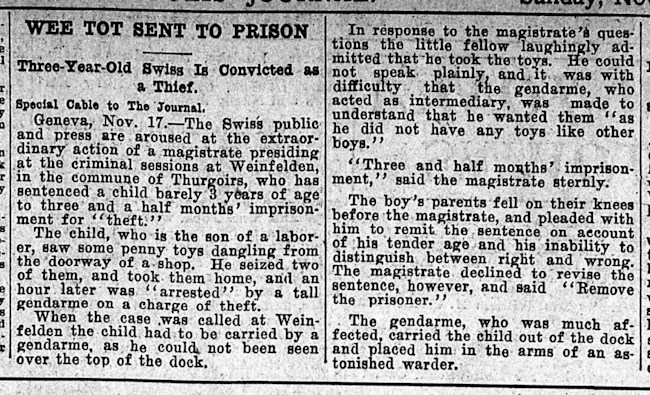Prisons
Prisoners who escape a day before release
The recurring weird news theme of prisoners who escape from jail a day before they're set to be released. Usually the escape isn't anything too complicated. They're on a minimum-security work detail, from which they simply walk away. But still, why leave if all you have to do is wait a day and be legally free? Because if caught again, they're looking at years of new imprisonment.Three examples below, though I'm sure there must be more. Worth noting: I didn't find any follow-up stories mentioning their capture. So maybe they all got away with that one extra day of freedom.

McComb Enterprise-Journal - Mar 11, 1990

- Sentinel News - Dec 13, 2013

-Newport Buzz - Mar 1, 2016
Posted By: Alex - Mon Jan 08, 2018 -
Comments (2)
Category: Prisons
Mongolian Box Prison

Source of photo.

Source of drawing.

Posted By: Paul - Thu Jan 04, 2018 -
Comments (7)
Category: Crime, Death, Dictators, Tyrants and Other Harsh Rulers, Prisons, 1910s, Asia
Coed Prisons
I hadn't realized that federal and state governments had, for a while, experimented with coed prisons. From Prison Journal, 59(1), Spring/Summer 1979:I'm having difficulty finding out if there still are any coed prisons in the US. I'm guessing there aren't.

Hattiesburg American - Aug 27, 1974
Posted By: Alex - Sat Nov 18, 2017 -
Comments (2)
Category: Prisons, 1970s
Pinky Bonded
Rachel Deckert was supposed to turn herself in at the Lewis County Jail on an outstanding misdemeanor warrant. She did. Problem was, she was pinky bonded to her girlfriend, and they couldn't separate. As a form of couples therapy the two had used epoxy to glue their pinky fingers together inside a copper pipe.Said Detective Patty Finch, "They haven’t been able to feel their fingers for three days."
Not clear how the two will be unattached. Pinky amputation is a possibility.
More info: The Chronicle

Posted By: Alex - Wed Nov 01, 2017 -
Comments (11)
Category: Prisons, Couples
Romanian Jail Craze
No matter how bad you think things might be, at least you're not in a Romanian jail pounding rusty nails into your head.For a related post, from way back in 2012, check out The Method of the Nail.

The Guardian - Aug 6, 1995
Posted By: Alex - Tue Aug 08, 2017 -
Comments (3)
Category: Prisons, 1990s
Inmate Escape Pod
1980: Fred Caddedu escaped from Millhaven penitentiary in Kingston, Ontario by concealing himself inside an "escape pod" made out of a hollowed-out stack of dirty food trays.The food trays were loaded onto a truck and taken to the unguarded, off-site kitchen to be cleaned. Once there, Caddedu just walked away. He was caught and returned to prison several months later.
His escape pod later became an exhibit in the Correctional Service of Canada Museum.

Image source: Museopathy

The Ottawa Journal - July 14, 1980
Posted By: Alex - Sun Mar 26, 2017 -
Comments (1)
Category: Prisons, 1980s
Operation Sleep

In 1957, the Woodlake road camp prison in California began an experiment in convict rehabilitation. It was called "Operation Sleep." The idea was to use sleep learning to reform convicts. As the prisoners slept, they heard the soothing voice of a psychiatrist speaking the following script:
I am truly happy. I give my life to my family, to my friends, and to the world. I am filled with love and compassion for all, so help me God.
The script had been written by the County's Public Defender, John Locke, with help from a local Presbyterian minister, Rev. Glen Peters, and a hospital therapist, Robert C. Lally. They described Operation Sleep as "a type of brain-washing — but not the type used by the totalitarians."
Unfortunately, there doesn't seem to be any data on whether the experiment actually had an effect of criminal behavior. The superintendent of the prison noted, "We have had excellent cooperation from the inmates. But of course, it is too early yet to tell what effect it will have. We won't know until after the men have been released and face the temptations of freedom again."
The picture at the top is from Newsweek (Dec 30, 1957), and shows one of the prisoners who participated in the experiment. The fact that he's sleeping with a dog seems a little strange. I guess the inmates got to keep pets in this prison.

Wilmington Morning News - Oct 11, 1957
Update: I found a news story from 1961 offering a 3-year update on Operation Sleep. I'm actually surprised that the prison kept the experiment going for that long. Public defender John Locke claimed that the experiment had been showing positive results, but said they needed to keep it going for another 3 years to be sure. From the Ottawa Citizen - Feb 21, 1961:
Almost from the beginning though, the guards at the road camps noticed that the young inmates did not cause the same amount of trouble they had created formerly and were surprised when prisoners started coming to them for counsel.
What is probably most indicative of the therapy's effect is the decrease in alcoholism revealed by surveys among ex-prisoners.
Posted By: Alex - Mon Sep 26, 2016 -
Comments (3)
Category: Prisons, Sleep and Dreams, 1950s
Wee tot sent to prison, 1906
Harsh justice in Switzerland.Could this boy perhaps have been the youngest person ever convicted of a crime and sent to jail?

The Minneapolis Journal - Nov 18, 1906
Three-year-old Swiss is convicted as a thief.
Geneva, Nov. 17 — The Swiss public and press are aroused at the extraordinary action of a magistrate presiding at the criminal sessions at Weinfelden in the commune of Thurgoirs, who has sentenced a child barely 3 years of age to three and a half months' imprisonment for "theft."
The child, who is the son of a laborer, saw some penny toys dangling from the doorway of a shop. He seized two of them, and took them home, and an hour later was "arrested" by a tall gendarme on a charge of theft.
When the case was called at Weinfelden the child had to be carried by a gendarme, as he could not be seen over the top of the dock.
In response to the magistrate's questions the little fellow laughingly admitted that he took the toys. He could not speak plainly, and it was with difficulty that the gendarme, who acted as intermediary, was made to understand that he wanted them "as he did not have any toys like other boys."
"Three and a half months' imprisonment," said the magistrate sternly.
The boy's parents fell on their knees before the magistrate, and pleaded with him to remit the sentence on account of his tender age and his inability to distinguish between right and wrong. The magistrate declined to revise the sentence, however, and said "Remove the prisoner."
The gendarme, who was much affected, carried the child out of the dock and placed him in the arms of an astonished warder.
Posted By: Alex - Sun Nov 08, 2015 -
Comments (8)
Category: Prisons, Babies and Toddlers, 1900s
Won’t happen again


Sources: The Daily Standard (Sikeston, Missouri) - Feb 11, 1956; Bridgeport Telegram (Connecticut) - Apr 4, 1955.
More in extended >>
Posted By: Alex - Sun Jul 19, 2015 -
Comments (5)
Category: Crime, Prisons, 1950s
Hitler tamed by prison
Epic prison board fail: This guy, Hitler. Prison has changed his ways. He won't cause any trouble now!
From The New York Times - Dec 21, 1924.
Posted By: Alex - Mon Jan 13, 2014 -
Comments (9)
Category: Predictions, Prisons, 1920s

| Who We Are |
|---|
| Alex Boese Alex is the creator and curator of the Museum of Hoaxes. He's also the author of various weird, non-fiction, science-themed books such as Elephants on Acid and Psychedelic Apes. Paul Di Filippo Paul has been paid to put weird ideas into fictional form for over thirty years, in his career as a noted science fiction writer. He has recently begun blogging on many curious topics with three fellow writers at The Inferior 4+1. Contact Us |




